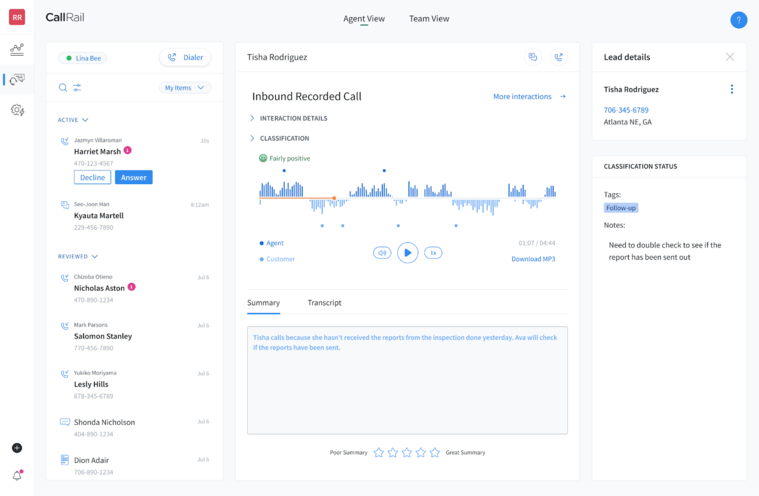In recent years, artificial intelligence (AI) has transformed various aspects of customer service, helping businesses automate tasks and deliver personalized experiences. The advancements in AI technology now enable companies to identify patterns, predict customer behavior, and provide exceptional customer support through innovative tools.
By leveraging AI-driven customer support tools, businesses can streamline their interactions with customers while also generating valuable insights to fuel continuous improvement. CallRail's Conversation Intelligence™, for instance, captures and analyzes customer conversations, providing key data points that empower teams to make data-driven decisions.
These insights can be instrumental in optimizing customer service strategies, identifying areas for staff training, and ensuring consistency in the service quality provided.
Selecting the ideal AI tools for customer service is crucial to staying competitive in today's business landscape. A comprehensive evaluation of available solutions is essential to identify which ones best align with your organization's unique customer service needs, ultimately improving the customer experience and driving business success.
The Importance of AI in Customer Service
The integration of Artificial Intelligence (AI) in customer service has become essential in today's fast-paced digital environment. It helps businesses to provide quick, efficient, and personalized support to their customers. One of the tools leading this trend is CallRail's Conversation Intelligence, an excellent choice for customer service teams.
AI-powered tools like Conversation Intelligence are designed to help businesses streamline their customer service processes. They help automate various tasks, such as responding to frequently asked questions, analyzing customer sentiment, and identifying trends or patterns. The automation of these tasks allows customer service agents to focus on more complex issues, improving overall efficiency and satisfaction levels.
In addition to enhancing productivity, AI-enabled customer service solutions can greatly improve the customer experience. By leveraging advanced algorithms and machine learning techniques, AI tools can provide accurate and personalized responses, ensuring that customer issues are resolved quickly and effectively. This, in turn, helps to build trust and loyalty, leading to an increase in repeat business and a more robust bottom line.
Moreover, AI-driven customer service solutions offer valuable insights and data that businesses can use to make informed decisions. For instance, data gathered from customer interactions can reveal preferences, habits, and pain points that may not be evident from manual analysis. This information can then be used to tailor product offerings, develop targeted marketing campaigns, and enhance overall business strategy.
The incorporation of AI technologies into customer service is proving to be a game-changer. By automating routine tasks, improving customer experience, and providing valuable insights, businesses are better equipped to meet the evolving demands of their clientele and thrive in an increasingly competitive landscape.
The best AI tools and their benefits
In this section, we will discuss some of the top AI tools for customer service, including CallRail's Conversation Intelligence, sentiment analysis tools, voice recognition software, and chatbots.
CallRail's Conversation Intelligence

CallRail's Conversation Intelligence is an excellent AI tool for customer service teams. It helps analyze phone calls and extract valuable information about customer interactions. By transcribing and analyzing calls in real time, this tool can identify:
- Customer inquiries
- Sentiment analysis
- Call summaries
- Follow-up opportunities
- Areas for improvement
- and more
This allows for better decision-making and helps businesses enhance their customer experience.
Sentiment analysis tools
Sentiment analysis tools can be crucial for understanding the emotions and opinions of customers during their interactions with a brand. By examining text data such as reviews, emails, and social media posts, these tools can detect patterns in customer sentiment, allowing businesses to make data-driven decisions to address issues or improve services. Sentiment analysis helps customer service teams identify trends and assess the overall satisfaction level of their customers.
Voice recognition software
Voice recognition software can improve customer service by enabling efficient and accurate voice-to-text conversion. This technology allows businesses to capture information and automate processes, such as routing calls to the appropriate department or providing self-service options for customers. Additionally, voice recognition software can reduce the need for manual data entry, which can save time and resources for customer service teams. Some popular voice recognition tools include Google Cloud Speech-to-Text and Microsoft Azure Cognitive Services Speech Recognition.
Chatbots
Chatbots are AI-powered tools designed to engage with customers through messaging platforms or websites. They can handle a wide range of tasks, from answering simple questions to guiding users through complex processes. Chatbots can provide instant responses, offering customers the information they need without waiting for a human agent. This results in quicker resolution times and prevents potential bottlenecks. Some popular chatbot platforms include Tidio and Drift.
Overall, these AI tools can greatly enhance customer service by offering efficient communication methods, enabling faster resolutions, and providing valuable insights for businesses to improve their overall customer experience.
Choosing the right AI tool
Budget considerations
When evaluating AI tools for customer service, it is essential to consider your budget. Different solutions come with varying price points and features. It is crucial to assess the overall cost, including implementation, maintenance, and updates. If you are on a tight budget, consider opting for AI solutions that offer scalable pricing options to meet your company's needs. For instance, CallRail's Conversation Intelligence provides a cost-effective and flexible pricing plan starting at $85/month
Ease of integration
Another important factor when selecting AI tools for customer service is ease of integration. The solution you choose should seamlessly work with your existing customer service platforms, CRM systems, and other related applications. This ensures a smooth transition and minimal disruption in your customer service processes. Additionally, the AI tool should have a well-documented API, making it easier to integrate and customize based on your specific requirements. CallRail's Conversation Intelligence, for example, offers easy integration with various CRM systems and marketing tools.
Business needs and goals
Lastly, aligning your AI tool selection with your business needs and goals is crucial to maximizing the benefits and effectiveness of the solution. Identify the key challenges you want to address in your customer service efforts, such as reducing response times, handling repetitive queries efficiently, or streamlining support processes. Evaluate the AI tool's features to ensure they cater to your needs. For instance, CallRail's Conversation Intelligence can analyze calls to unveil actionable insights, helping businesses improve their customer service interactions and overall customer experience.
By considering these factors - budget, ease of integration, and alignment with business needs and goals - you can confidently choose the right AI tool to elevate your customer service capabilities. CallRail's Conversation Intelligence offers an excellent example of an AI solution that meets these criteria, making it a valuable addition to customer service teams looking for powerful AI-driven insights.
Customer service use cases for Conversation Intelligence
CallRail's Conversation Intelligence is an AI tool designed to improve customer service teams' efficiency. By analyzing customer interactions in real-time, this tool provides valuable insights and helps in addressing customer needs with precision.
One use case for Conversation Intelligence is automated keyword spotting. The tool identifies essential phrases during customer interactions, allowing teams to prioritize issues and address them effectively. Keyword spotting saves time and resources, enabling customer service agents to focus on more complex tasks while ensuring customers get accurate information.
Another use case is sentiment analysis. Conversation Intelligence evaluates the emotion behind customer interactions, helping service teams recognize dissatisfied or upset clients. This knowledge allows for prompt intervention and swift resolution, leading to improved customer satisfaction rates.
Furthermore, the tool offers valuable performance metrics for service teams. Through comprehensive data analysis, Conversation Intelligence provides vital information on agent efficacy, call durations, and response times, among other metrics. Teams can use this data to improve their processes and performance, leading to better customer experiences.
Conversation Intelligence is a powerful AI tool that streamlines customer service operations. By automating keyword spotting, conducting sentiment analysis, and providing essential performance metrics, this tool supports service teams' efforts to deliver exceptional customer experiences.
Future trends in AI for customer service
As the adoption of artificial intelligence in customer service continues to grow, several trends are emerging that can help businesses improve their customer interactions. One such trend is the increasing use of chatbots, which are predicted to have substantial market growth in the coming years. The global chatbot market size could reach USD 27,297.2 million by 2030, with a compound annual growth rate (CAGR) of 23.3% from 2023 to 2030. These automated conversational agents can efficiently handle routine tasks and customer queries, freeing up human agents for more complex issues.
Moreover, AI technologies have the potential to deliver up to $1 trillion of additional value each year in global banking, with customer service improvements contributing to a significant portion of this value. Financial institutions are increasingly leveraging AI-powered tools to enhance their customer service offerings, providing personalized experiences that cater to individual needs.
Generative AI, which can create new content or suggestions based on existing data, is another key trend emerging in the customer service domain. When guided by humans, generative AI tools require higher-order cognitive skills such as judgment, insight, moral reasoning, and innovation. These capabilities allow AI to supplement human customer service representatives, enabling them to solve complex problems and provide better support to customers.
In summary, the future of AI-driven customer service looks promising, with chatbots, AI-enabled customer engagement tools, and generative AI expected to drive significant advances in the field. As companies work to stay competitive, the adoption of these technologies will likely play a crucial role in shaping the customer service landscape of the future.
Try Conversation Intelligence today
AI tools play a crucial role in enhancing the effectiveness and efficiency of customer service. Among the top contenders, CallRail's Conversation Intelligence stands out as a valuable tool for customer service teams. By leveraging AI, businesses can provide better support, handle inquiries faster, and maintain higher customer satisfaction.
CallRail's solution offers simplified communication, empowering agents to focus on key aspects of customer interactions. This approach allows for streamlined resolutions to customer issues. Moreover, it reduces the cognitive load on service representatives, enabling them to be more proactive.
Utilizing AI technologies ensures that customer service teams stay up to date and competitive. By staying informed and making smart choices, businesses can optimize their resources and drive better results. In summary, the implementation of AI tools can significantly transform the customer service landscape, providing outstanding experiences for both customers and staff.








